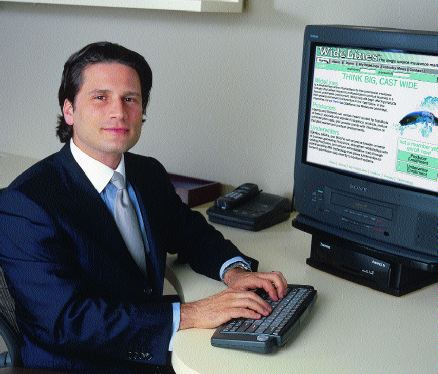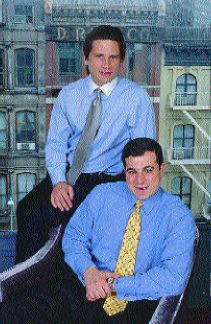BOLSTERING E-LOYALTY
WideLines seeks to broaden
how producers and carriers interact
By Brett Hanavan

Adam Pelzman is chairman and chief executive officer of WideLines, LLC, an online commercial insurance marketplace.
If you believe the hype, the Internet has changed the world. In fact, it has changed how people in the world do business and receive information. The Web is speedy, tidy, and diversified, and it's growing every second.
It is this perception that WideLines, LLC, Chairman and Chief Executive Officer Adam Pelzman would like the property/casualty insurance marketplace to have ingrained in its future awareness. Pelzman is WideLines' corporate visionary. He and Executive Vice President of Business Development Frank Panayotou, have taken a concept and are turning it into reality.
WideLines markets itself as being created for insurance professionals, by insurance professionals. In fact, WideLines' top executives do have a unique mixture of industry experience. During his tenure as an investment professional at Marsh & McLennan Capital, Pelzman made private equity investments in the insurance and financial services industries.
Panayotou oversees all the business development activities for WideLines. Like Pelzman, he gained most of his experience with Marsh & McLennan--managing a book of Fortune 500 clientele as part of Marsh's risk management client services division. He also managed Marsh's Middle Market sales efforts for its Connecticut operations and held brokerage positions in Marsh's FINPRO specialty products division.
WideLines operates a new online commercial insurance marketplace that allows insurance producers and underwriters to conduct business in a secure, automated environment.
The company is off to a healthy, innovative start following its May 2000 launch and is seeking to carve its niche in the world of platform technology by allowing agents and carriers to standardize the insurance process, information sharing, and to bolster communication.
 "WideLines will allow better customer service, keep administrative costs down, and encourage more online data storage and transmission resulting in less paperwork."
"WideLines will allow better customer service, keep administrative costs down, and encourage more online data storage and transmission resulting in less paperwork."
-- Frank Panayotou, Executive Vice President of Business Development
The WideLines Marketplace has a real-time "demonstration" function available on its Web site to allow potential customers to immerse themselves in the WideLines method of doing business. It is a process that has style and purpose.
Through its use of XML (extensible markup language) technology, WideLines intends to streamline business processes without totally reinventing the system. WideLines is using the technology to bolster what it terms "e-loyalty," and to build relationships between parties who couldn't-or wouldn't-normally do business together.
"Carriers can use our technology as a cross-selling tool," Panayotou says. "With several lines of business cross-referenced, the agent has an opportunity to identify potential exposures with his/her client and advise on various lines of business. There is no re-keying of information and with the time saved, they have the time to explore other lines. The carrier maintains the platform and it minimizes the errors and omissions exposure on behalf of the agent."
The XML platform is designed to handle: application and submission information, policy specifications, an underwriter communication interface with the agent, quotation ability, binding and issuance, endorsement, and renewals.
In the wide world of market, capital, supply and demand, WideLines is like the Golden Gate Bridge of information transportation.
The WideLines executives say its database--which is free to producers--will be robust and will allow better customer service, keep administrative costs down, and encourage more online data storage and transmission resulting in less paperwork. Central to this is WideLines' XML-based technology platform. XML, when worked into the format of an insurance carrier, allows data and processes to be communicated easily between agent and underwriter. The carrier can transmit and manage insurance data on behalf of producers and underwriters.
 "WideLines' system provides a user-friendly advantage for the producer ... the producer, vital in commercial risk placement activities, retains full control of the process."
"WideLines' system provides a user-friendly advantage for the producer ... the producer, vital in commercial risk placement activities, retains full control of the process."
--Adam Pelzman, Chairman and Chief Executive Officer
This technology development has been promoted to near-legend status among industry professionals within the last five years. XML technology has increasingly been on the minds of carriers and agents alike. XML Industries, LLC, another company formed by Pelzman and used by WideLines, has developed a functional B2B platform that connects insurance producers with underwriters using a consistent platform. It features a single entry, multi-company interface (SEMCI) that provides what WideLines' executives call "synchronous data transmission" between the two parties.
WideLines is deploying XML technology to the insurance marketplace in two ways. First, it is being offered through WideLines' online commercial insurance marketplace.
Second, XML Industries, LLC, WideLines' sister company, is offering XML technology as a technology infrastructure solution. It will license its software to underwriters and provide them the ability to provide product offerings over the Web for distribution through their private label Web sites. This allows the carrier to provide customized online forms for producers, receive electronic submissions, issue real-time quotes, and bind and issue policies online.
"Our technology is embedded in the customer's site," Pelzman explains. "It uses our technology host security encryption and can interact with only that organization's producer base."
Pelzman emphasizes that nothing was outsourced in the technology development arena within the company, that technology is a core competency and with it remaining in house, the company can respond to the needs and desires of its customers with clear focus.
There are now 1,000 producers online and WideLines has presence and business capabilities in all 50 states. Pelzman says the goal is to reach 10,000 producers within two years.
A look at the process
WideLines' system provides a user-friendly advantage for the producer, allowing the producer to initiate transactions, and then send an alert to the insured to allow full completion of underwriting questions and submission information. The producer, vital in commercial risk placement activities, retains full control of the process.
Internally, for the underwriter, the benefit of the XML generator is evident in that turnaround time on quoting is greatly reduced, meaning that the potential for selling and servicing the account is maximized. The system generates a detailed comparison of quote information as well as other material policy terms and generates a quote letter from the submission information that is interfaced with a producer/underwriter template.
For a producer whose customer might have multiple needs for different commercial insurance products, the producer enters WideLines, calls up the client under a specific category of coverage, and inputs the insured's name, which will be immediately accessed from the database. The data is all cross-referenced, essentially to one file for that insured. The submission could be sent immediately to every underwriting company that does business in the pre-selected line of business in that state.
 Pelzman and Panayotou, both with experience at Marsh & McLennan, say WideLines was created for insurance professionals, by insurance professionals.
Pelzman and Panayotou, both with experience at Marsh & McLennan, say WideLines was created for insurance professionals, by insurance professionals.
By providing the marketplace with these abilities, the cost of the network application for users who need to import data into pre-existing local management information systems is greatly reduced.
Pelzman points out that the personal nature of the relationship between the underwriter and the producer is not disrupted.
"Online negotiations of
policy terms and one-on-one communication is still possible in this system," Pelzman says. "All the essential elements can be captured in our database. A highlight sheet, a binder and policy forms are issued. We have developed technology that allows the underwriter to automatically generate completed policies that conform to the rules and regulations of each state's insurance department."
The producer has two submission options, either by submitting data through an Internet browser-based protocol, or through the XML-based broker system. Multiple methods are available to the underwriter including an e-mail or fax that can be received in plain text format, through an Internet browser, through XML transport, or by an FTP server. From here, the data can then be transferred into the carrier or insurance organization's underwriting systems.
The WideLines platform facilitates the creation (which is actually a conversion) of interactive online applications from existing forms to HTML language. Completing and encoding applications consistently for various carriers has long been a concern of producers who submit multiline risks to several carriers. The data transmission is capable of supporting an array of information that includes ACORD or carrier/broker specific-XML, supporting exposure information, policy specifications that include details and endorsement activity, and claim information that is vital for underwriting and pricing risks.
Producers can use either Microsoft Explorer or Netscape Navigator to access WideLines' system. The tiered system contains multiple security layers including user level passwords for different levels of access. This assures that all data transmitted between the underwriter and producer is kept private and properly encrypted for each risk.
Panayotou adds that agents and producers need to continue in their efforts to become more computer literate-from learning the simplest aspects of dial-up, cable, and DSL connections to the Internet, to online processing of insurance transactions.
"Carriers are doing more due diligence on their agents and producers," he notes. "They're looking closer at who they decide to do business with, and in turn they're evaluating their business partners such as WideLines more closely."
Pelzman notes that most agents and producers already have strong working relationships with underwriters for standard, more traditional lines of commercial liability, BOPs, etc., but need assistance with difficult-to-place business such as D&O, employment practices or environmental coverage. So WideLines is focusing its marketing efforts on attracting commercial specialty lines business.
"We recently met an agent from a three-person agency," Pelzman recalls, "who had a client who was getting into the oil delivery truck business. The agent needed to find coverage for the trucks. He called two carriers he works with and neither would touch the risk. The customer had to turn somewhere else to place the business. The agent lost an account that could have generated $50,000 in premium and as much as $5,000 in commission. He lost all lines of business that he'd been writing because he couldn't find a market for the new exposure. At our site we would have allowed him to provide the products while putting his relationship in place with underwriters as well as his client."
Pelzman reports that WideLines has an alliance with Business Risk Partners, a Hartford-based managing agent with professional liability rights to write on Lloyd's paper. It has a presence in all 50 states on either an admitted or nonadmitted basis. In addition, it has alliances with Rockwood Programs and Philadelphia Insurance Companies which are providing several professional liability lines.
Pelzman says WideLines' goal is to have four or five carriers per line of business in every state. This way all traditional types of coverage are spanned, along with all specialty lines.
The author
Brett Hanavan is a San Diego, California-based freelance journalist who has worked in the insurance industry for 13 years. He is a former staff writer for Insurance Journal West.
For more information:
www.widelines.com.
©COPYRIGHT: The Rough Notes Magazine, 2001
|

